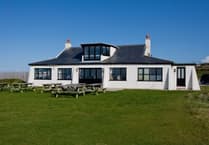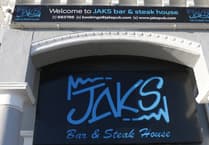Most people have heard of Billy Butlin in the context of holiday camps.
But was he the first to set up a holiday camp? And if so where was it? The answer is no he wasn’t.
The first camp of its type was at Howstrake above Groudle.
Joseph Cunningham and his wife Elizabeth opened the original, all-male, tented city in 1894.
It attracted up to 600 men per week.
By the end of the century it was open from May to October at a cost of 17/6 a week.
The success of this initial venture, in no small part down to the organisational ability of Mrs Cunningham, led in 1904, to the acquisition of five acres of agricultural land at Victoria Road not far from the Falcon Cliff.
There some 1,500 tents and a 100-foot dining pavilion were erected for the season between March and October.
The Howstrake Camp continued, though now in other hands, but clearly successful as by 1914 the original restaurant block had been extended and new blocks added.
Howstrake continued in operation until 1985 when a fire gutted the main dining hall and repairs were not thought to be economically viable.
Since then abandoned buildings and the old swimming pool have deteriorated and stood as stark reminders of the previous use of the site.
In 2019 planning permission was obtained to build a luxury home on the site and as I passed by on my walk recently work is underway and the unsightly buildings removed.
I am not sure in whose ownership the boundary fence and former shelter are in, but it would be good to see them both tidied up as well. Published between 1911 and 1914 during the summer months a magazine aimed at the tourist trade and in particular passengers on the Steam Packet fleet of ferries was the ‘the Manxman’ and I was taken with a contribution in issue six of 1912.
Look past the dated language but the writer touches on an important feature of the Isle of Man at the time.
Mr CF Denton wrote: ‘I come away built up mentally and physically and with a better conception of men and things.
‘If you have lived in an English manufacturing town, I daresay you know the “feel of the gasp” to get away from the belching smoke stacks, the bricks and mortar ,and out into God’s great green world, into the unconfines of some far off pasture land wherein one may live that life of breadth and freedom.
‘Begot of open spaces, flowering meadow lands and the scent of wild hawthorn and jasmine until you shriek because of the joy of living.
‘But you ask sir is this utopia, or is it really to be had? It is really to be had thanks to Mr Cunningham’s fertility in evolving his great white canvas city on the slope land of glorious old Douglas bay!’
Cunningham’s Camp tents could sleep up to eight men, spring beds being placed on a wooden floor (lifted every 10 days for cleaning) and D. Collister held the franchise to supply photos of the campers as well as general views of the camp.
.jpeg?trim=113,0,347,0&width=752&height=501&crop=752:501)
Indeed, as someone interested in the social history of our island and in particular the tourism aspect, I have a number of postcards of the same.
Press comment at the time was some surprise at the class mixing which took place in the camp, its clientele were by no means only working-class youth.
The family ran an efficient and very effective publicity machine that drew campers back each year. The ‘Camp Herald’ was an annual advertising booklet issued as part of this machine. The camp grew its own vegetables and soft fruit, the most popular meal in the dining hall was kippers and jam.
As a keen kipper eater, I have always enjoyed mine with brown bread and lime marmalade so I know why this was so sought after.
As the camp prospered the Cunninghams acquired more supporting services for example Ellerslie Farm in 1915 which was modernised by internee labour so much so that the camp became almost entirely self-supporting having its own dairy, pigs (fed from the camp swill) and so on.
Joseph Cunningham was a staunch Presbyterian so no alcohol was allowed on the camp, a rule that was strictly observed. He was an ardent temperance advocate throughout his life. Although Cunningham claimed that his visitors would not otherwise have come to the island, the boarding house keepers claimed bitterly that he was undercutting them, especially as the rates he was paying on his five acres of ‘agricultural land’ were considerably lower than that of a typical boarding house.
There was also much disquiet about the morals of the campers and in 1911 a public meeting in the town hall in Douglas was held to protest against the perpetuation of alleged illegalities at the camp and later in the season a second agitation forced the council to introduce bye-laws to regulate such camps (including forbidding women to stay). As part of the agreement with the council, Cunningham agreed to provide more permanent buildings. The original wooden huts were replaced by chalets built by World War One internees under supervision by local workmen. Again this was a first in the British Isles with the construction of ‘holiday chalets’.
Fine dining rooms, a concert room, cinema, billiard room, indoor heated swimming pool, laundry and bakehouse were constructed.
Outside there were tennis courts, bowling green, miniature golf and a sports field.
The accommodation catered for 3,400 young men. It was one of the foremost business concerns in the island and it was a temperance establishment. When war broke out in 1914 of the 2,800 young men in the camp, 2,000 immediately left to join the armed forces, along with 153 of the 200 staff.
The premises were taken over by the military as an internment camp. In December 1915 Joseph Cunningham was elected to the House of Keys as member for North Douglas. He was re-elected in 1919 and immediately afterwards as one of the first four representative members of the legislative council.
He was also appointed captain of the parish of Marown in 1919. The boy scout movement started in the Isle of Man in 1908 and in 1911 Joseph Cunningham became eastern district commissioner.
When founder Robert Baden-Powell visited the island that year he was presented with a ‘thanks badge’, one of the first on record to have received this honour.
In 1912 he became the island commissioner for scouts.
His sudden death aged 71 in 1924 came as a great shock and a crowd including several hundred boy scouts and girl guides followed his cortege from St Andrews Church to the Douglas Borough Cemetery.
I was a scout with 5th Douglas, and I remember going to Cunningham House off Peel Road to collect my uniform.
I also remember the holiday camp in the 1960s though in different ownership.
We would go swimming and roller skating with the holidaymakers always promising but never actually keeping in touch. I also remember the chair lift up from the promenade to the camp. I’ve only covered a little of the story of Joseph Cunningham here, but thoroughly recommend the book written by Jill Drower, his great-granddaughter published in 2018, entitled ‘Good Clean Fun!’.
.jpeg?trim=28,0,101,0&width=752&height=501&crop=752:501)


.jpeg?width=209&height=140&crop=209:145,smart&quality=75)
